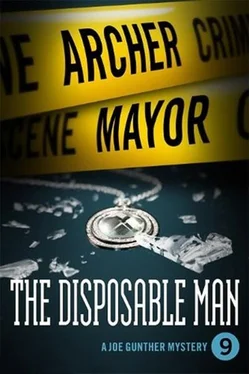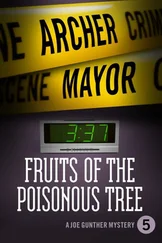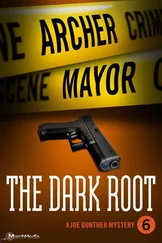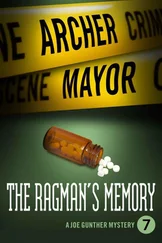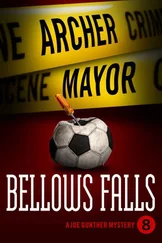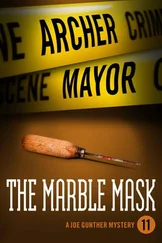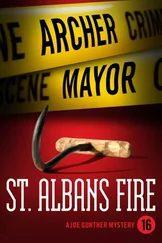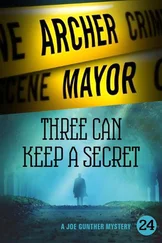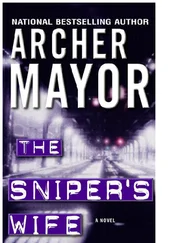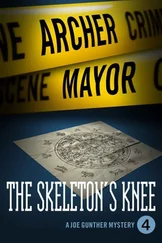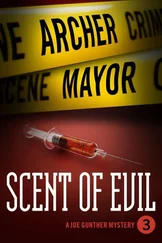Archer Mayor - The Disposable Man
Здесь есть возможность читать онлайн «Archer Mayor - The Disposable Man» весь текст электронной книги совершенно бесплатно (целиком полную версию без сокращений). В некоторых случаях можно слушать аудио, скачать через торрент в формате fb2 и присутствует краткое содержание. Год выпуска: 2013, ISBN: 2013, Издательство: MarchMedia LLC, Жанр: Полицейский детектив, на английском языке. Описание произведения, (предисловие) а так же отзывы посетителей доступны на портале библиотеки ЛибКат.
- Название:The Disposable Man
- Автор:
- Издательство:MarchMedia LLC
- Жанр:
- Год:2013
- ISBN:9781939767080
- Рейтинг книги:3 / 5. Голосов: 1
-
Избранное:Добавить в избранное
- Отзывы:
-
Ваша оценка:
- 60
- 1
- 2
- 3
- 4
- 5
The Disposable Man: краткое содержание, описание и аннотация
Предлагаем к чтению аннотацию, описание, краткое содержание или предисловие (зависит от того, что написал сам автор книги «The Disposable Man»). Если вы не нашли необходимую информацию о книге — напишите в комментариях, мы постараемся отыскать её.
The Disposable Man — читать онлайн бесплатно полную книгу (весь текст) целиком
Ниже представлен текст книги, разбитый по страницам. Система сохранения места последней прочитанной страницы, позволяет с удобством читать онлайн бесплатно книгу «The Disposable Man», без необходимости каждый раз заново искать на чём Вы остановились. Поставьте закладку, и сможете в любой момент перейти на страницу, на которой закончили чтение.
Интервал:
Закладка:
The mystery surrounding most killings, of course, is not in discovering who did it. By and large, that’s as challenging as following a trail of blood from one room to the next, where some distraught friend or family member is found holding the weapon. The mystery is in the why-why this person? Why now? Why this sudden rage?
If we actually do have a situation where the culprit is not in the immediate vicinity, then we’re usually faced with two alternatives: a series of leads that takes us to someone we can then present to the State’s Attorney, or-on very rare occasions-a dead end that grows more hopeless by the day.
The investigation I was facing, however, followed neither of those norms. While apparently a dead end, it also seemed to be growing in scope. Invited to a city renowned for its lack of clarity, I had no illusions that the CIA would lift the veil from my eyes. Which left me wondering what I was being drawn into-and why.
Although quiet, smooth, and remarkably clean-attributes for which the Washington Metro was justifiably famous-the subway ride to Judiciary Square was long and predictable, and by the time I arrived, my mind had been dulled by the blurred succession of trains, stations, and thousands of blank faces sealed behind glass. The familiar discomfort of being in close quarters with so many withdrawn people had begun to envelop me.
I half fled for the exit, toward fresh air and open space, climbing flight after flight of stairs, dogged by the memory that Washington’s subway system had supposedly been designed to double as a bomb shelter. When I finally reached the foot of the last steep escalator and looked up the sun-bleached exit shaft, I saw the sweltering swatch of flame-blue sky with the same relief I’d felt upon entering the Metro’s air-conditioning earlier.
The illusion of returning to the land of the living was just that, however, since the escalator delivered me to the heart of my destination-the broiling hot, dazzlingly bright National Law Enforcement Officers Memorial. From a cool, muted subterranean world of stone-faced commuters, I’d ascended into a three-acre, oval frying pan made of white-hot marble, in which, at the moment, I was the only human being.
The memorial, with an imposing bronze plaque at its center depicting an officer’s shield superimposed by a single rose, extends out in a series of widening topographical parentheses, made variably of colonnades, trees, and shaded walkways, and finally, at its outermost edges, of two pathways banked by a continuous, curved, knee-high marble wall, inscribed with the names of over fourteen thousand law enforcement officers killed in the line of duty.
Only a few years old, the memorial reflects several standard monument styles-from archways to statuary to a shallow pool of running water. But the most effective is an homage to the style of the Vietnam Memorial, wherein a seemingly endless list of names is arranged as randomly as the ways in which those officers were slain.
Sweat already trickling down my sides, I crossed to a softbound directory housed in a weatherproof case and squinted against the sun to look up three names: Frank Murphy, John Woll, and Dennis DeFlorio.
All had been members of my department-Murphy, the man I’d replaced as chief of detectives; Woll, a young patrolman; and DeFlorio, one of my own squad. But contrary to the implied heroism of this formal, austere setting, none of these friends had died catching bullets intended for the civilians they’d served. Murphy had been killed in a mundane car crash, Woll’s murder had been staged to resemble a suicide, which by that time his own miseries had made all too believable, and DeFlorio had been blown apart by a car bomb.
I collected the reference numbers for each of them and entered the tree-canopied pathway to find their names, grateful for the shade, reminded of the dense, multihued woods of Vermont. As I sat on the rounded stone bench facing the inscribed wall, exchanging silent greetings with my three friends, my chagrin became less for their loss and-typical of most mourners, I think-turned back onto myself. I began recalling all that had brought me up to this point-the daily exposure to despair, deception, and misconduct-and wondered why I’d made some of the choices I had.
Law enforcement had never entered my mind as a youth on the farm, any more, I guessed, than it had those of most of the people now etched on this wall. But somehow that’s where we’d all ended up, perhaps wanting to be of use to others, or seeking shelter against the vagaries of a capricious upbringing, maybe hoping to find some measure of elusive self-confidence. There are those who believe police officers become so merely to compensate for personal inadequacies. But by and large, I’d found that most cops just sort of end up in the job, after which the good ones do their best to make it count, despite the airless niche in which society has placed them.
In the final analysis, it was the pure normalcy of the people on this wall, and that they’d died doing something few people understood, that saddened me most.
I stayed there until the sun had dipped low enough on the horizon that I no longer needed the trees for protection, and then I headed off on foot to complete the second half of my pilgrimage.
The Korean War Memorial, located near the base of the Lincoln Memorial, was so new it didn’t appear on most tourist maps. Almost a half century old, with casualties rivaling Vietnam-although lasting a mere fraction of that struggle’s length-Korea’s conflict remained a footnote war, treated almost as a post-World War Two afterthought-a fact the memorial’s too recent appearance served more to highlight than to dispel.
Returning to the United States after my stint in it, I’d been struck by the lack of fanfare greeting us, especially given what vets had encountered a mere seven years earlier. At the time, I’d been deeply offended, feeling my teenage sacrifices had been cavalierly dismissed. Now, I knew such reserve probably had more to do with the nation’s emotional numbness. The Nazi/Japanese Axis had bathed the globe in blood, and the Soviets were threatening to do the same using nuclear weapons. What chance was there for a local boundary squabble, so equivocally viewed by our own leaders that they avoided calling it a war? It would be fifteen more years before the country took a deep breath and voiced its outrage over Vietnam. And by then Korea, never resolved in any case, had been all but forgotten.
Brought low by the long drive, the listless subway ride, the blistering barrenness of the law officers memorial, and my own ruminations about a case without issue, I worked to clear my head by walking all the way, even though it was almost a mile and a half distant. I stopped to eat a sandwich at a neighborhood deli and saw my first sustained human interaction since leaving home. The counter people were loud and gregarious and treated their customers with the casual irreverence of long-standing friends. It was an easy, open exchange, as restorative as the food I ate, and sent me on my way in a much better mood, as I rationalized that much of what had been plaguing me was no more than a provincial prejudice against a huge urban environment.
It was dark by the time I reached the reflecting pool but not much cooler. The tradeoff for walking had been a reminder of just how tenacious southern heat can be. It radiated off the sidewalk, as from a wood stove in the middle of winter, and filled the air-in a startling paradox-with the familiar parched odor of warm silage, the acres of cropped grass around me substituting for the farm fields of memory. The jacket I’d been wearing had gone from being slung over my shoulder to being held uncomfortably in one sweaty hand.
But I had no complaints. This part of Washington, especially at night, subdued most petty complaints with its sheer wide-open majesty. The pale-lit Washington Monument, a red beacon at its apex, looked otherworldly in the surrounding darkness, its daytime absurdity replaced by the mysterious murmurings of its Egyptian forebears. And its aura spread outward like a thin mist, snagging on the spotlit architectural oddities that belted the Mall like an ancient ring of mountains. I took it all in, from the Capitol to the museums to the gargantuan, recumbent federal buildings, with the happy acceptance of a willing tourist. I walked the length of the quarter-mile pool-Lincoln’s tomb-like tribute reflecting in the water like a ghost-and yielded utterly to the theater of it all, using the countless historical cues to carry me back to my past.
Читать дальшеИнтервал:
Закладка:
Похожие книги на «The Disposable Man»
Представляем Вашему вниманию похожие книги на «The Disposable Man» списком для выбора. Мы отобрали схожую по названию и смыслу литературу в надежде предоставить читателям больше вариантов отыскать новые, интересные, ещё непрочитанные произведения.
Обсуждение, отзывы о книге «The Disposable Man» и просто собственные мнения читателей. Оставьте ваши комментарии, напишите, что Вы думаете о произведении, его смысле или главных героях. Укажите что конкретно понравилось, а что нет, и почему Вы так считаете.
